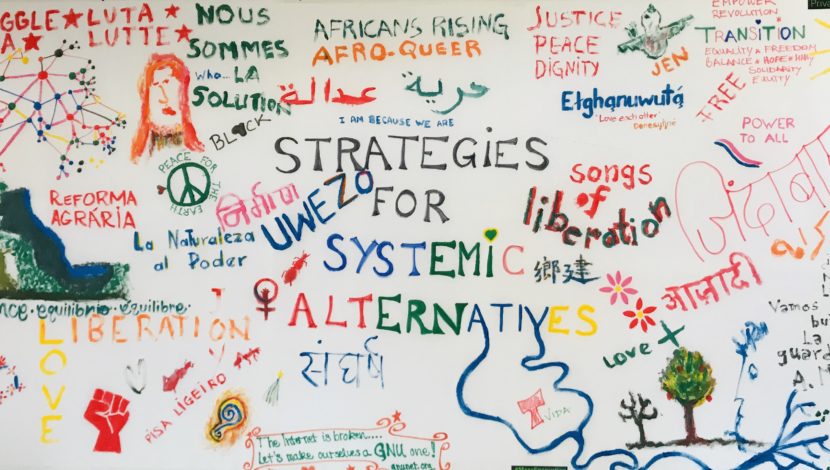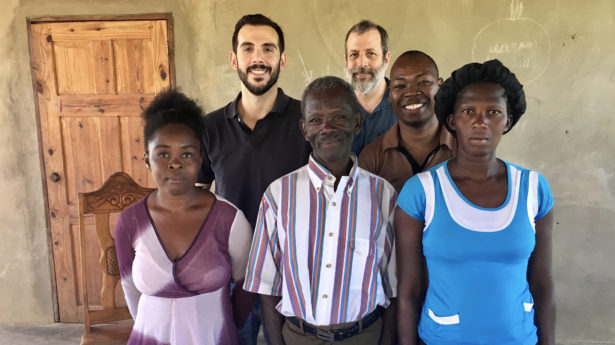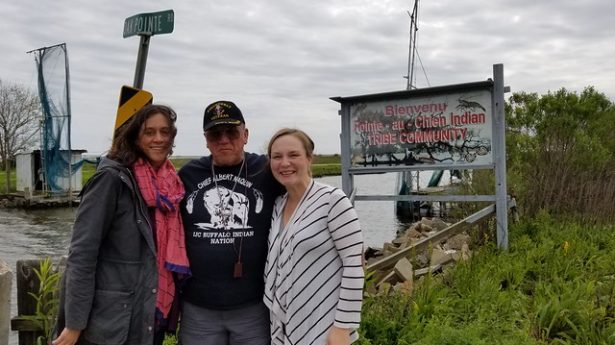The Unitarian Universalist Service Committee advances human rights through grassroots collaborations.
Reflections From The Freedom Side: On Progressive Grantmaking

By Michael Kourabas on April 30, 2019
Earlier in April, I traveled to Brazil to attend the second Global Engagement Lab (GEL) retreat and this year’s EDGE Funders Alliance annual convening. While not a large funder, UUSC does provide direct support to grassroots organizations, in addition to offering advocacy, justice education, and human rights research. As such, we joined EDGE to learn ways to improve our own grantmaking practices and to also potentially influence other funders by modeling more progressive practices. Below are some reflections from that trip.
Held in Brazil from April 9-12, this year’s annual EDGE convening was a bold experiment that challenged many conventional non-profit and funder practices. For one, it was preceded by a three-day “Systemic Alternatives Symposium,” which brought together 60 activists and movement leaders from nearly 40 countries to discuss systemic crises and their alternatives – a gathering not attended by funders. Planned over the course of many months by a committee of funders, movement leaders, and EDGE staff, the symposium was a response to the criticism that funder-organized convenings are often extractive of frontline groups. If representatives from affected communities are invited into funder gatherings at all, there is usually little attention paid to what they might want or need from the experience; instead they are usually there merely to speak to, and therefore benefit, funders.
The second part of the experiment came after the symposium, when the activists and movement leaders gathered with funders for a funder-movement “encounter,” or “encontro.” The encontro was an attempt to model a new way for funders and movements to come together and, while imperfect and messy at times, it was still a deeply impactful and promising experience for a few reasons.
Collective Power
First, the encontro encouraged all of us to move beyond the constraints of the funder-movement dichotomy and instead see each other as a group of individuals committed to “systemic change” – i.e., solutions that address the underlying systems (capitalism, white supremacy, patriarchy, etc.) that fuel global human rights crises, rather than merely applying Band-Aids to the symptoms. In that way, the encontro also put our collective power on full display.
On the morning of the encontro, the main conference room was buzzing with energy and anticipation, often breaking into impromptu chants from popular movements around the world (“Free Palestine!”; “Lula Livre!”). Throughout the day, we were reminded of the shared nature of the struggle for justice, regardless of where that struggle is taking place. There were explicit calls from activists to deepen solidarity across movements, generations, and geographies – to build locally but with a global perspective, much as the global Far-Right has done in an effort to rollback progressive advancements around the world. Whatever our individual differences, what united all of us in that room was far more powerful and self-evident.
A Call to Bolder Action
It also felt clear to me that many of us not on the frontlines need to be bolder. This seemed especially true while in Brazil, home to the largest grassroots movement in Latin America, site of the first World Social Forum, and where an authoritarian head of state is waging war on the poor, the Black community, women, Indigenous peoples, LGBTQI persons, and the environment. While movements and affected communities continue to fight for their lives and the lives of future generations – in Brazil and around the world – many of us more removed from systemic oppression seem too comfortable taking small steps (and I include myself here as well). In reflecting on this, we must also recall the many similar calls to action – often from People of Color – that emerged from previous movements. This is urgent now, just as it has been urgent for Communities of Color for hundreds of years.
Inquiry & Personal Transformation
What if those of us who are not directly affected – funders, and white people in particular – are more radical? In our political positions, acts of solidarity, and the political education of our staffs, supporters, and boards? Cindy Wiesner of Grassroots Global Justice Alliance, an advisor to the GEL and one of the boldest activists I have the honor of knowing, asks, “Are we living our politics?” A similar question, “What are we willing to risk?,” emerged at the GEL retreat in Brazil, prior to the EDGE convening. I think these and related questions are the kind we must grapple with as we undertake the personal transformations necessary for systemic change in society. In so doing, we can be guided by Dismantling Racism Works’ grounding assumptions, in particular that “none of this [work] is easy and we have to do it anyway.”
To close the encontro, we engaged in a “jornada internacionalista” exercise. Participants self-organized by continent or geographic region, and then offered something to the larger group – a chant, a song – to provide some insight into their culture. This being largely a group of activists, most cultural offerings came from popular struggles. For our performance, the American group chose “Freedom Side,” a modern take on “Which Side Are You On?,” a song with roots in the labor and civil rights movements.
The song poses the question, “Which side are you on, my people?,” to which an unambiguous, “We’re on the freedom side!,” is hollered in response.
As people of conscience, we must pick a side and it must be the “freedom side.” Of course.
But what does it mean to be on the “freedom side”? What is required of us? What must we sacrifice or be willing to risk? What is the internal work we need to do in order to truly be “on the freedom side?” How do we do it? What stands in our way?
After an emotional and inspiring week in Brazil, these are the questions I’m left with. I hope you’ll join me in exploring them.
Photo Credit: Michael Kourabas
***
About UUSC: Guided by the belief that all people have inherent worth and dignity, UUSC advances human rights globally by partnering with affected communities who are confronting injustice, mobilizing to challenge oppressive systems, and inspiring and sustaining spiritually grounded activism for justice. We invite you to join us in this journey toward realizing a better future!

